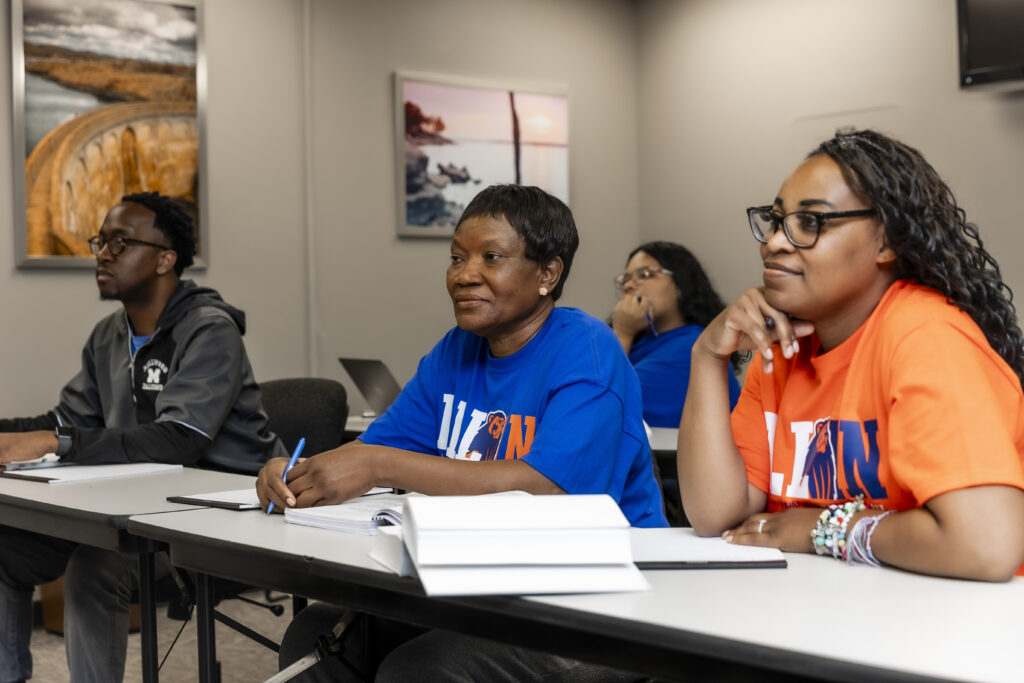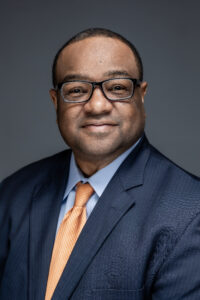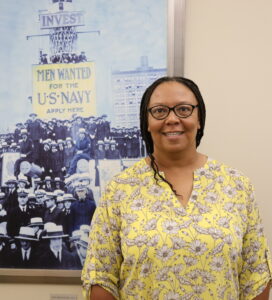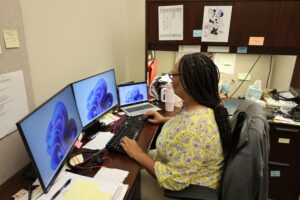Changing Lives for 25 Years: LU’s Rehabilitation Counseling Program Celebrates 25th Anniversary

(This story was originally published in ‘E Roar Digital Magazine | Vol. 2 Issue 6)
by Ellie Melero
It was a normal fall day in Oklahoma City, and Terrance Grayson was feeling restless. He had called in sick to work that morning, but he wasn’t physically ill. He was just sick of his job.
Grayson had been working for the same financial lending company since graduating college, and he was good at his job. He had risen quickly to a managerial position and was making good money, but he hated the work. He wanted to do something different with his life. He wanted a career that felt fulfilling and where he could help others. He just wasn’t sure what that career was.
That day, he told himself that because he hadn’t gone to work, he needed to find something productive to do. He decided to go for a walk. While strolling down the street, he saw a sign for Langston University and made an impulse decision to walk inside. At the front desk, Grayson asked what graduate programs they had available, and that’s when he learned about LU’s brand new master’s degree in Rehabilitation Counseling.
“I just walked up to Langston (University) and asked them if they had any programs,” Grayson said. “I literally walked in off the street and met with Dr. Moore, and I talked with him about it and filled out an application and just started down that path.”

That was in 2000. Grayson was part of the inaugural class for the Rehabilitation Counseling master’s program. Now, he has been working for Rose State College in Midwest City, Oklahoma, for almost two decades, and he loves his job.
The Rehabilitation Counseling master’s program came together as the result of a partnership between LU and the Oklahoma Department of Rehabilitation Services. The two institutions collaborated on a grant proposal for the U.S. Department of Education’s Rehabilitation Services Administration and were awarded $500,000 to hire faculty, fund student scholarships and fund student conference travel.
Dr. Corey Moore was hired in October 2000 to create the program, and he became the Founding Director. Dr. Moore came from the University of Arkansas–Fayetteville’ Rehabilitation Research and Training Center on Persons who are Deaf and Hard-of-Hearing, where he served as a research assistant professor. His experience and expertise have shaped the LU program for the past 25 years.
“I saw the mission of the graduate program in rehabilitation counseling as to train rehabilitation and mental health professionals to meet the needs of people with disabilities,” Dr. Moore said. “Teaching, research and service.”
For months, Dr. Moore worked to recruit faculty and students while putting together a curriculum worthy of accreditation. In Spring 2001, the program officially launched at the LU-Oklahoma City campus with its first cohort of 18 students.
Alongside Grayson, Sharon Caldwell was a member of that inaugural class.
Caldwell was a graduating senior in LU’s Health, Physical Education and Recreation program when she first heard about vocational rehabilitation counseling. She had originally come to LU with the goal of becoming a physical therapist, but as she approached graduation, she was no longer sure that’s what she wanted. At her professor’s recommendation, she decided to attend an information session about the new Rehabilitation Counseling program.
“Initially, when I went to Langston, I felt like my passion was physical therapy because I knew I wanted to help people in some type of way,” Caldwell said. “When I heard about the rehab counseling program, those individuals work with individuals with disabilities to help them… to make them become more independent. The fact that the vocational rehab counselor was helping individuals achieve something, I think that kind of sparked my attention.”

Grayson and Caldwell were excited about the program and the opportunities it offered them. With his scholarship, Grayson was able to quit the job he hated and focus on school full time. As she progressed through her classes, Caldwell discovered a clearer path to her future.
Their cohort became close friends during school. They joked they were “the guinea pig class” because the program was still trying to determine the best ways to do things, but the students knew they were still getting a quality education. They liked working with one another, they liked their professors and, even while working for hours on research papers, they were having fun learning.
“I’d say, educationally, it was the best experience I’ve ever had,” Grayson said. “They opened all these doors to me and provided me with all the support, and without that, I’m not sure I would’ve been able to do it… The environment was just so nurturing that it was everything I needed at the time.”
All 18 members of the first cohort graduated from the program on time and found work in the counseling industry. Grayson worked for the Oklahoma Department of Rehabilitation Services for almost three years before he began working at Rose State. He has held various positions there, and he is now the Director of Academic Outreach.
Caldwell completed an internship/practicum with one of her professors at PROS and Associates during school, and she accepted a full-time position there after graduation. She worked as a rehabilitation counselor for three institutions before accepting a position as a counselor with the U.S. Department of Veterans Affairs in 2012. Since then, she has worked in the Veterans Readiness & Employment Program in Oklahoma City, and she is now the Employment Coordinator.
The first few cohorts that went through the Rehabilitation Counseling program were so successful, the university decided to expand the program in 2004 and offer the master’s degree at the LU-Tulsa campus, too. In 2008, LU-Tulsa added a bachelor’s in Rehabilitation Services, and the School of Education and Behavioral Sciences officially created the Department of Rehabilitation and Disability Studies with Dr. Moore as the Founding Chair.
The Rehabilitation Counseling program earned its accreditation through the Council for Accreditation of Counselors and Related Educational Programs. In 2013 the Department of Rehabilitation and Disability Studies established LU’s first Rehabilitation and Research Training Center (RRTC) that conducts research on capacity building for minorities. A second RRTC has since been established that conducts research on advancing employment opportunities for people with disabilities with the greatest support needs.

The RRTCs are nationally recognized and funded by the National Institute on Disability, Independent Living and Rehabilitation Research. Through the RRTC, the Department of Rehabilitation and Disability Studies established a post-doctoral program for recent doctoral graduates to train in advanced research methodology and statistics. The RRTC has hosted seven doctoral fellows over the past eight years, all of whom have gone on to work at other universities, federal agencies or community-based rehabilitation service programs.
All of this grew from the master’s degree.
While they celebrate this milestone anniversary for the Rehabilitation Studies graduate program, Dr. Moore and the faculty in the Department of Rehabilitation and Disabilities Studies continue to look for ways to improve and grow the program. They are focused on workforce needs. They try to listen to their community and be responsive to the demands of employers. They have created an informed and research-based curriculum that prepares graduates for the demands of a career as a vocational rehabilitation counselor.
“It’s been 25 years of joy and of just a remarkable journey,” Dr. Moore said. “I’m excited about that, happy about that, thankful for it. We look forward to continuing to push the program forward in the future, and I think great things are beyond the horizon.”




